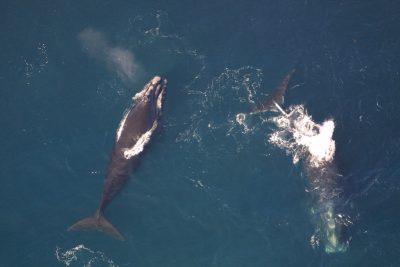The endangered North Atlantic right whale, which lives off the coast of Massachusetts, may go extinct due to human activities and climate change.

An estimated 400 right whales remain, and the species has been on the endangered species list since 1970, according to the National Oceanic and Atmospheric Administration. After commercial whaling in the 1890s nearly wiped out the species entirely, the population gradually recovered.
The right whale population reached its peak in 2011 at 481 whales, according to a recent report by the National Marine Fisheries Service at the North Atlantic Right Whale Consortium.
However, the whale population is again decreasing, with a higher death rate than birth rate.
Sharon Young, senior strategist of marine issues for the Humane Society of the United States, said warming waters caused by climate change have forced cold-water-dwelling plankton, the whale’s preferred food source, to move farther and farther north.
The whales have followed the plankton north, Young said, only to find dwindling resources.
Right whales must compete with other planktivores for food, Young said, many of which may be better adapted to the “urbanized coastline.”
“We’ve got an urban ocean that is creating tremendous hazards for them once they’re alive,” Young said. “And we have climate change, which is shifting habitat use if they want to find resources, and they may not be finding the resources in the abundance that they did before.”
She added that as coastlines become increasingly urban, the whale’s risks of getting hit by boats and becoming entangled in commercial fishing lines have heightened. Many boaters, Young said, are careful around whales.
Federal regulations prohibit boats from traveling within 500 yards of a right whale, said Kate Swails, acting communications supervisor at NOAA’s Greater Atlantic Regional Fisheries Office.
“We have certain areas along the coast where vessels need to slow down if right whales are in the area,” Swails said. “We’re currently analyzing the effectiveness of these measures to determine if we need to modify them in any way.”
Swails said NOAA is developing rules for fishers to prevent fishing line entanglement.
Young said entanglement is the biggest threat to right whales and that fishers must switch to other methods, such as ropeless fishing, which smaller fisheries have adopted.
Commercial lobster fishing companies switched from natural fiber rope to sturdier polypropylene or plastic rope in the 1950s, according to Young. Right whales could be released from the natural fiber if caught, but are less likely to break through the polypropylene rope.
There were an estimated 366 right whales in January 2019 and fewer than 94 breeding females, a decrease from January 2018 when there were 412 whales, according to the NMFS report.
The right whale is typically found along the East Coast of the U.S., traveling as far north as Canada and as far south as Florida, according to NOAA.
The whales can grow up to 52 feet long, and feed on tiny organisms that they filter out of the water with baleen plates that function as a strainer.
The Humane Society and other conservation organizations sued the NMFS in 2018 for failing to protect the whales. A judge ruled the service must update fishing rules by next May.
The lawsuit was the only way the government would take action, Young said.
“As humans, we’re pretty resistant to doing anything differently,” Young said. “The sad thing is we’ve not taken any steps toward doing it without litigation.”
For conservation efforts to be successful, Young said, the public must understand the whale’s importance.
“‘Save the Whales’ has become such a cliche,” Young said. “But that’s what we’re talking about here. The point is, if we can’t save a large whale, what hope does any other less charismatic animal have?”


















































































































